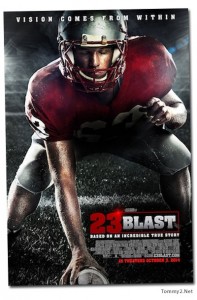23 Blast
Posted on October 23, 2014 at 3:57 pm
B| Lowest Recommended Age: | Middle School |
| MPAA Rating: | Rated PG-13 for some teen drinking |
| Profanity: | Mild schoolyard language |
| Alcohol/ Drugs: | Teen drinking, drinking game |
| Violence/ Scariness: | Character becomes blind, scenes in hospital, sad offscreen death |
| Diversity Issues: | A theme of the movie |
| Date Released to Theaters: | October 24, 2014 |
23 Blast is the name of a football play, and “23 Blast” is based on the real story of Travis Freeman, a high school football star who lost his sight, but, with the help of a courageous coach and committed teammates, was able to keep playing.
The real hero of the movie is the coach, played by “Avatar” villain Stephen Lang, with a touch of dry with along with his determination and sense of honor. The film’s very first scene, with the coach working with a group of young boys as he learns he will be getting a job with the high school team, introduces us to him as a man of character who understands that the win that counts is the integrity and teamwork he instills in his players. And it introduces us to the tone of the film, honest, unvarnished, and real. You may think you know where a fact-based story about a blind player on a high school football team is going, but this film will surprise you.
That first scene also introduces us to the boys who will become the stars of the team, Travis (a very likeable Mark Hapka) and Jerry (Bram Hoover, as the bad boy with a good heart but a weak will). They are very different people. Travis plays by the rules. He is respectful, reliable, and grounded in his faith. Bram cannot resist a party, and as for rules, they are for ignoring or for breaking. But on the football field, they have a bond. Their passion for football, and their deep understanding of its options, demands, and strategies connects them. Travis is devoted to football because it is his nature to give himself fully to whatever he takes on. Bram is devoted to football because it is the only place where he feels at home.*
One night following a game, Travis becomes ill at a party. The next day he wakes up with severe swelling on his face. His parents take him to the hospital and the doctor tells them he needs immediate surgery. “You’re going to have to take the cross off,” the nurse says as he is wheeled into the operating room. He survives the surgery, but he is blind.
At first, Travis is devastated. He will not leave his room. He refuses to cooperate with the occupational therapist (a warm and spirited Becky Ann Baker). But a dream of a sermon seemingly directed to him and a visit from the coach opens up possibilities he thought were foreclosed. “I’m going to need you to step up,” the coach tells him. “The team needs a leader. Are you that guy?”
It seems impossible. How will he run, tackle, catch? The coach makes him the center and he has to learn a whole new set of skills. But learning that he can learn is revelatory. Some of his teammates are not on board. His ties with Jerry are tested by Jerry’s irresponsible and self-destructive behavior. But the coach understands that the most important thing he can teach these players is not the techniques or strategy but the meaning of being a part of something bigger than each of them.
This is quiet, even modest storytelling, with a surprising final punch, an inspirational tale that never becomes sugary or preachy.
Parents should know that this film includes teen drinking and a drinking game. A character becomes blind and there is a sad offscreen death.
Family discussion: What do we learn from Travis’ dream about the sermon directed at him? Why was Patty able to help him? Would you be willing to have a disabled player on your team?
If you like this, try: “Brian’s Song” and “Remember the Titans”
